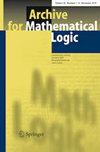积极的不可辨认性
IF 0.4
4区 数学
Q1 Arts and Humanities
引用次数: 0
摘要
我们将寻找不可分辨树和数组的各种定理推广到正逻辑中:基于现有的s树建模定理,我们证明了str树、str(_0/)树(str树的还原,忘记了长度比较关系)和数组的建模定理。在此过程中,我们证明了更强的版本,即基于s树的str-trees和基于str-trees的str(_0)-trees的建模定理,而不是基于s树的局部建模定理或基于str-trees的EM-建模定理。作为应用,我们证明了如果一个厚正理论有 2-\(\mathsf {TP_2}\), 那么它就有 k-\(\mathsf {TP_2}\)本文章由计算机程序翻译,如有差异,请以英文原文为准。
Positive indiscernibles
We generalise various theorems for finding indiscernible trees and arrays to positive logic: based on an existing modelling theorem for s-trees, we prove modelling theorems for str-trees, str\(_0\)-trees (the reduct of str-trees that forgets the length comparison relation) and arrays. In doing so, we prove stronger versions for basing—rather than locally basing or EM-basing—str-trees on s-trees and str\(_0\)-trees on str-trees. As an application we show that a thick positive theory has k-\(\mathsf {TP_2}\) iff it has 2-\(\mathsf {TP_2}\)
求助全文
通过发布文献求助,成功后即可免费获取论文全文。
去求助
来源期刊

Archive for Mathematical Logic
MATHEMATICS-LOGIC
CiteScore
0.80
自引率
0.00%
发文量
45
审稿时长
6-12 weeks
期刊介绍:
The journal publishes research papers and occasionally surveys or expositions on mathematical logic. Contributions are also welcomed from other related areas, such as theoretical computer science or philosophy, as long as the methods of mathematical logic play a significant role. The journal therefore addresses logicians and mathematicians, computer scientists, and philosophers who are interested in the applications of mathematical logic in their own field, as well as its interactions with other areas of research.
 求助内容:
求助内容: 应助结果提醒方式:
应助结果提醒方式:


